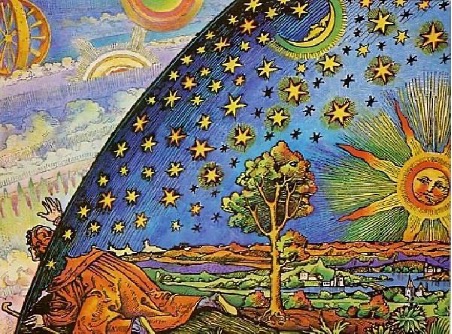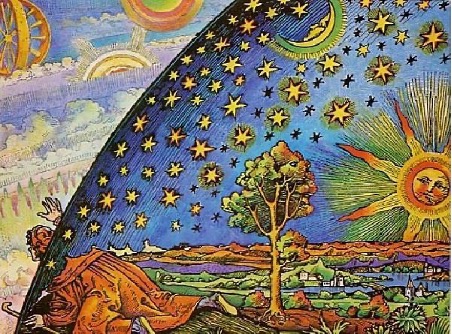Transformation implies change. In our case, a transition from the lower self, or the machine, to the higher self, third eye, or worlds 6 and 12[1].
Third eye is blessed by seeing things as they are. This the supreme reality Meher Baba[2] spoke of. If we are sincere, one of the first realizations in spiritual evolution is that most of the time we are in imagination. By imagination we mean not only the incessant turning of thoughts, but also our deeply-ingrained convictions about the world and ourselves.
How, then, can we ascend from the thin film of false reality, as Ouspensky put it, to higher dimensions of existence? We first climb these steps by observing ourselves. By observation, we mean seeing ourselves in reality, as a machine. The lower self is highly dissatisfied with the recording of its unconscious antics, as a contemporary spiritual teacher put it. This dissatisfaction stems from the inability of the lower self to be conscious, or present.
The higher and the lower are often inseparable. The link between them is a part of the machine that can commit to the pursuit of presence. The Fourth Way calls this part the steward. The steward is the seat of intelligent emotion. The steward is backed up by the intellectual part of the emotional center (“the nine of hearts”), which does most of the work.
Fortunately, we are not alone. Evolution is made possible by help from above. If we sincerely aspire to the highest, higher forces, gods or angels[3], will be with us. Nothing can be done without them. They are older, wiser, and stronger than we are, as a contemporary spiritual teacher put it.

Missionary where Sky and Earth Touch (1888 Flammarion Wood Engraving)
At the root of spiritual evolution is the transformation of suffering. Something inside must change for us to glimpse reality. In the image above, we see a person emerging from ordinary existence to an altogether different one. Nature can be quite beautiful. Higher worlds, however, are infinitely lovelier.
“God created a mirror: its shining face, the heart; its darkened back, the world; the back would please you if you have never seen the face.” – Rumi
Suffering can be useful, as Ouspensky put it. However, if it comes from personality, the part in us that is imaginary, we gain nothing from it. Suffering can come from the part in us that is more real, from essence. In this case, separating from it internally can yield marvelous results.
Our ultimate goal is to distinguish the real from the unreal, moment to moment. This task requires luck as well as patience, as results may tarry.
“To die is different than any one supposed, and luckier.” – Walt Whitman[4]
A word about death may be in place. Externally, death is the cessation of life. It can, however, bear another meaning. Our efforts to attain consciousness can come to a definite end. Christ said that “Life is a movement and a rest.” Some of J. S. Bach’s[5] most profound musical compositions allude to a desired state of repose. Indeed, a prayer consisting of a definite series of steps can lead to a profound state of consciousness.
“The deceased is a nose that breathes.” – Egyptian Texts
The author has been a student of the Fourth Way for four decades. For other articles in the FourthWayToday magazine by Benjamin, see: https://fourthwaytoday.org/author/benjamin-b/.
See Ouspensky’s description of observing ‘I’ and the deputy steward, from his meetings in London: https://selfdefinition.org/gurdjieff/Ouspensky-A-Record-of-Meetings.pdf.
For more articles on the role of the steward in our magazine, see: https://fourthwaytoday.org/transcending-the-system/.
[1] Worlds 6 and 12 are synonymous with the higher mental and higher emotional center, respectively.
[2] Meher Baba (1894-1969) was a spiritual teacher.
[3] By gods or angels, we mean women and men who managed to gain an eternal, immaterial existence during their earthly sojourn.
[4] Walt Whitman (1819-1892) was an American poet.
[5] Bach (1865-1750) was a German composer and musician.
